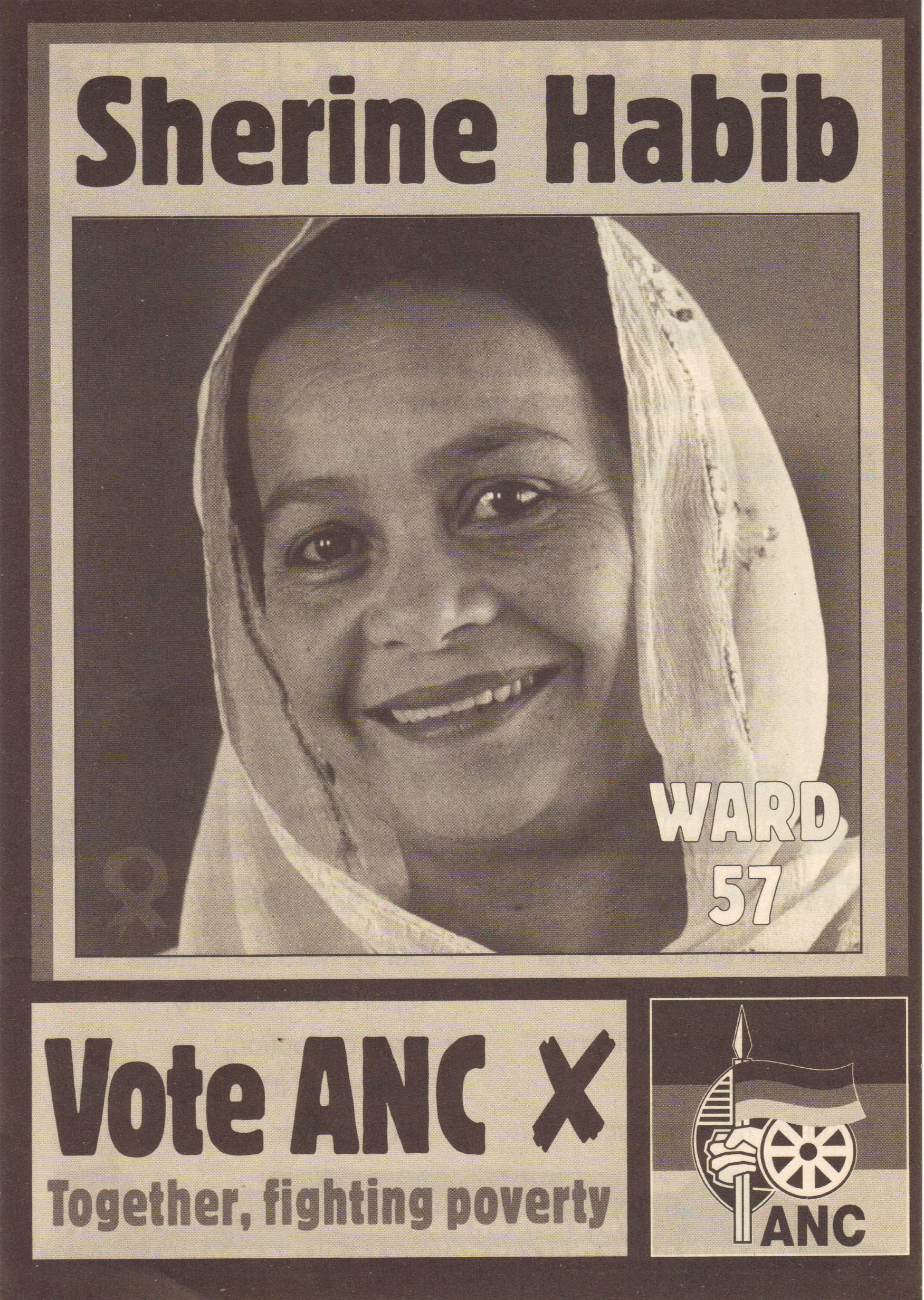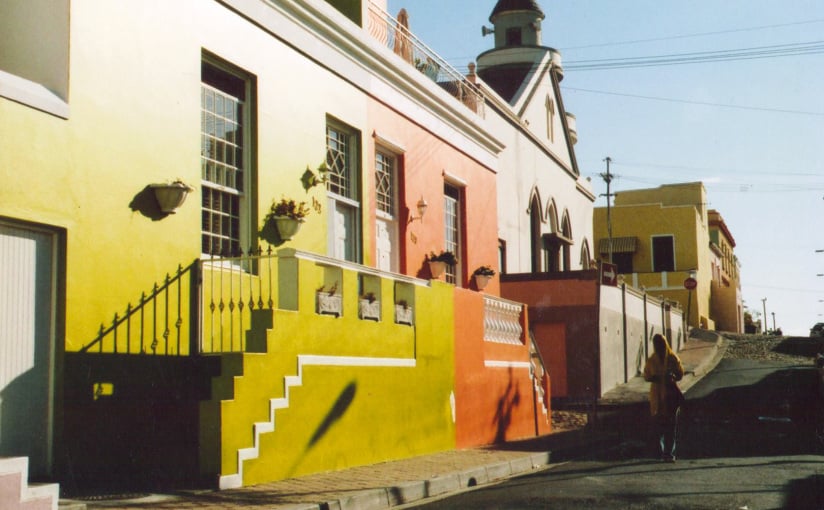Shereen Habib was born in 1952 in a house at the top of Bo-Kaap, Cape Town’s “Malay Quarter”. The predominantly Muslim neighbourhood’s population is mostly descended from convicts, political exiles and slaves from the former Dutch East Indies.
Shereen’s family has lived in Bo-Kaap for almost a century. During apartheid’s darkest days when most non-white people were banished to designated neighbourhoods and townships on the outskirts of the city, including Shereen and her husband, her parents remained in the house on the hill.
She returned to Bo-Kaap after a decade with her husband in a formerly “coloured” area. It was home, she says. “After so much anger and so much death and so much shooting down, with my children witnessing it all, we were traumatised. I wanted to get back to where I knew best – where there was love and laughter – and so I came back here. And that’s when I knew that this is where I wanted to start telling my story.”
And that’s exactly what she’s been doing for the last two decades. Shereen invites people to see the neighbourhood where she grew up, through her eyes, either by joining one of her guided tours, or exploring at their own pace with VoiceMap’s Bo-Kaap walking tour. Claire van den Heever visited Shereen in her home to ask her a few questions.

Claire: Tell me a bit about yourself
Shereen: My name is Shereen Misbah Habib – my surname is Habib, my husband’s surname is Misbah. I was born in Bo-Kaap in 1952: the tricentenary or bicentenary of Jan van Riebeeck. I always remember – well, my mother, she always reminds me – that we got special treatment. We got fruit and flowers in hospital when I was born.
I finished college and I didn’t study to be a tour guide, I studied something else: I was going to be a teacher. So, I ended up doing many other things and in the meanwhile, I was exiled from here. I married a French Huguenot and my first daughter is from him. I couldn’t live here because he was white and I was black, so we left and went to the Seychelles. But I couldn’t keep up with the flying back and forth, and after two years I fell pregnant and I came back here to stay. Then my husband left and went to the States and I couldn’t live there, so we parted and I came home and stayed, and gave birth here.
I got married again to my first boyfriend and had one daughter and three sons. My husband died in 2002. We were in the United Democratic Front – we were sort of the student body of the ANC. Those people who had detention without trial were living with us in the Cape Flats – that’s where I lived with my husband, surrounded by his family.
In 1990 we came to Town, and in 1995 we moved into this house. But in the meantime, in 1993, I went back to study and I decided to become a tour guide to tell my story about how my life went.
Claire: Tell me more about how you became a tour guide
Shereen: In 1991, I was in the right place at the right time. When I met Mr Mandela for the second time at INDABA [a major tourism marketing event], he didn’t like that me and my husband were in the back of the room. He said “No, we must be in the front.” He said “No – apartheid is finished!”
She laughs shyly.
Then I did my course with Andre de Waal. I was asked to be the institute [for Bo-Kaap], so all the people coming through Andre de Waal came to my garage here so that I could give them the history. They didn’t know anything about the Bo-Kaap, and at that time Achmat Davids was still alive – the man who wrote all the books about Bo-Kaap, and a doctor – and he was my mentor. He sort of designed my tours and gave me the name, and he was behind me.
Claire: Bo-Kaap was one of the only areas in the city to survive the forced removals that happened as a result of the Group Areas act – is that correct?
Shereen: Yes. So everywhere else in the city, people were taken out from here – to Athlone, and other areas. District Six was completely uprooted. When they came here to bulldoze and they brought the bulldozers into High Level Road, there was such an outcry! We had Jewish architects, we had British people who lived alongside here, we had them all coming to Cape Town and coming to stand with the community to say no to it. Then they somehow criticised the government in newspapers, saying “You’re sitting up in Pretoria, do you know what kind of architecture there is in District Six that you just bulldoze them down and say the houses are in a bad state – are you crazy?”
And Bo-Kaap was saved, but at the same time they told us, you know, you have to go or we will push you out. And we said no problem. First, we’ll take you to court because we have a big piece of land right over there where the saints are buried that belongs to us. So we are going to build onto that graveyard.
She cackles.
And this was so frightening for them! “Oh, these are the builders!”
“And we’re going to build without your permission,” we said. “And this is going to go to the world news!” So, they gave up, ja. Because they knew the builders were the Malay people, and they were always the hotheads to stand in court with, and they decided they were going to give up because they knew the Malay people would fight.
Claire: What do you like most about living here?
Shereen: For me, I like the fact that the community has respect for one another. I like that there’s never little complaints in the streets. Although my children have so many cars with friends coming to visit – they still have the tolerance and the patience to treat them like their own children, and that’s nice. There’s no “We hate this one, and we hate that one.” You know, there is always greeting and sending each other a little bit of cake, just to acknowledge that we are still around – always talking a little bit, asking “How’s your health?” you know. It’s very important. The older you grow the more important it becomes when people acknowledge you as still a part of what is happening around you. And the connection is still there, so you don’t feel lonely. And that’s nice about Bo-Kaap: it has its sisterly and brotherly love that’s still around. I hope that never dies.


Hi Shereen, please can you tell me why there is no “For Sale” or “Sold” sign at St Monica’s. We have heard that part of the property has been sold. We are presently living at St Monica’s and they are moving to Riebeek West from 1 June 2017 and we are not going with them. Kind regards, Val Solis
p.s. we are desparately looking for accommodation in the Bo Kaap, such as a room, as we are pensioners and cannot afford rentals in the Cape, please help.
It was very interesting to read about Shereen’s memories. I have had a great opportunity to learn more histories fron Shereen when I stayed at her home in 1999, she is excelent a very kind woman.
I will aporeciate if I can receive a contact back from her.
Luis Paulo
From Mozambique
Me too Paulo… but I don’t have Shereen’s email address or cell number… do you?
Martin Rattle
Hi Shereen
Dying to renew contact with you again… been a very long time. Hope all going well. I’m between Stanford, Hermanus and CT S/Subs. Involved with radio again (LM Radio, Capital 604), and other old broadcast colleagues… but not with several others… the death toll has been relentless for several years now!
I’d love to have a few minutes chat when not too busy…
Martin Rattle 0834567773